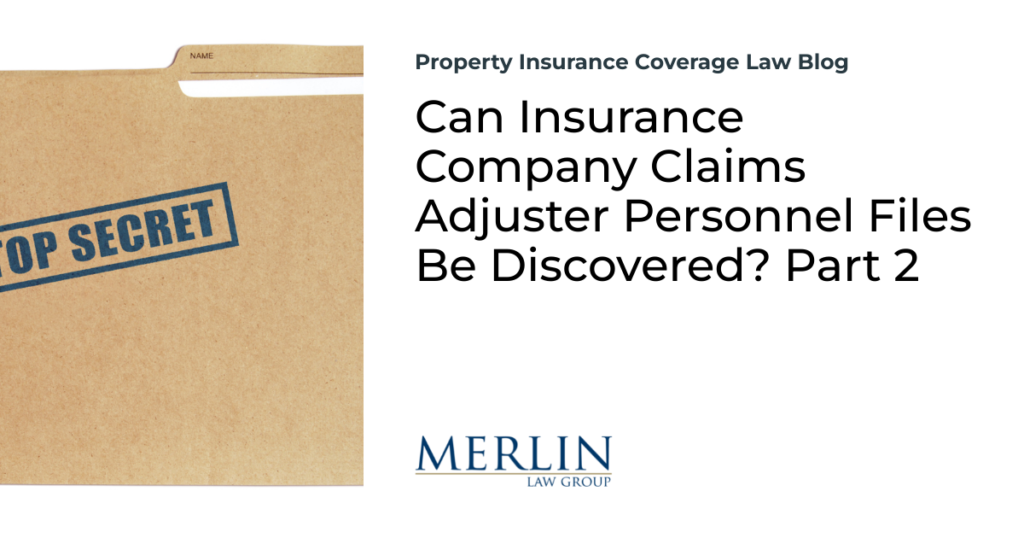Can Insurance Company Claims Adjuster Personnel Files Be Discovered? Part 2

This blog follows my previous blog, Can Personnel Files Be Discovered? In my previous blog, I explained that some courts have held that when the information in personnel files is discoverable when it is “clearly relevant” and the information is “not otherwise readily available.”1 To further explore how courts have interpreted this, I’ll focus on what courts have considered being “clearly relevant” in this regard.
“Clearly Relevant”
In Weller v. American Home Assurance Company,2 the trial court made the distinction that when applying the test of “clearly relevant,” there exists a distinction between employees whose conduct is directly involved and other employees. When the files sought are those of employees whose direct actions are relevant, “the relevance requirement is generally satisfied by the fact that the personnel file and employee evaluations should indicate the training, experience, work record, and qualifications of the employee.”3
In Blount v. Wake Electric Membership Corp.,4 the Plaintiff sought discovery of the personnel file of Defendant Champion. The Plaintiff alleged in this case that negligence on the part of Defendant Champion while acting as an agent of the other Defendant, Wake Electric, caused the Plaintiff’s injuries.5 The court stated that Defendant Champion’s personnel file could reveal whether Defendant Wake Electric “failed to hire qualified employees, negligently delegated tasks to underqualified, untrained or inexperienced employees or did not adequately supervise employees.”6 The court stated the file could also show if there had been specific instances of negligence by the particular employee, Defendant Champion, and due to these reasons, the court found Defendant Champion’s personnel file met the test for being “clearly relevant.”7
In Howard v. College of the Albemarle,8 the Plaintiff filed a lawsuit against Defendants, a North Carolina community college, and president of the COA, Kandi Deitemeyer, alleging employment discrimination, wrongful termination, and intentional infliction of emotional distress from Defendant’s conduct. Plaintiff requested the court compel production of Deitemeyer’s personnel records.9 Due to Plaintiff’s allegations focusing on Deitemeyer’s conduct, the court found that Defendant’s personnel records here were “clearly relevant.”10
When requesting personnel files through discovery, it is important to determine whether the files you seek are that of an employee whose actions were directly involved or other employees. This distinction will set the standard for how the file’s relevance will be determined.
1 Can Personnel Files Be Discovered?, Property Insurance Coverage Law Blog, Jan. 11, 2023.
2 Weller v. Am. Home Assurance Co., No.: 3:05-cv-90, 2007 U.S. Dist. LEXIS 27284, at *18 (N.D. W.Va. Apr. 10, 2007).
3 Id. (citing Blount v. Wake Elec. Membership Corp., 162 F.R.D. 102, 106 (E.D.N.C. 1993)).
4 Blount v. Wake Elec. Membership Corp., 162 F.R.D. 102, 105 (E.D.N.C. 1993).
5 Id. at 106.
6 Id.
7 Id.
8 Howard v. Coll. of the Albemarle, No. 2:15-CV-00039-D, 2016 U.S. Dist. LEXIS 109242, at *1 (E.D.N.C. Aug. 16, 2016).
9 Id. at *9
10 Id.







